
War and homophobia wreak havoc on the lives of an overseas missionary couple’s teenage daughter, her Ugandan girlfriend, and the outwardly maimed, inwardly wounded 13-year-old soldier who interrupts their impromptu wedding ceremony one dark and devastating night in Hansol Jung’s Cardboard Piano, the gut-punching latest from International City Theatre.
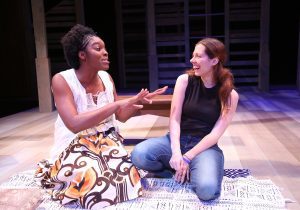 It’s New Years Eve, 1999, and Chris (Allison Blaize) and Adiel (Dashawn “Dash” Barnes) are in the midst of plighting each other their troth when their makeshift wedding is suddenly interrupted by Pika (JoJo Nwoko), on the run from an army that drafted him three years ago at age ten to do battle in his country’s long ongoing civil war.
It’s New Years Eve, 1999, and Chris (Allison Blaize) and Adiel (Dashawn “Dash” Barnes) are in the midst of plighting each other their troth when their makeshift wedding is suddenly interrupted by Pika (JoJo Nwoko), on the run from an army that drafted him three years ago at age ten to do battle in his country’s long ongoing civil war.
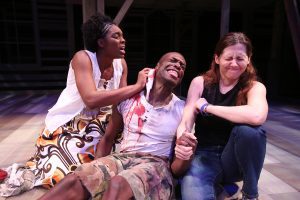 And that’s about all that should be revealed about Jung’s powerful new play, world premiered two years ago at Louisville’s prestigious Humana Festival and now being given a superbly staged and acted Los Angeles premiere.
And that’s about all that should be revealed about Jung’s powerful new play, world premiered two years ago at Louisville’s prestigious Humana Festival and now being given a superbly staged and acted Los Angeles premiere.
Suffice it to say that if Cardboard Piano’s “Part I” reveals the devastating effect of war on children forced to commit soul-destroying atrocities and of religious intolerance on those deemed in defiance of “God’s laws,” its post-intermission “Part II” suggests, if not necessarily better times, at the very least the possibility of forgiveness and redemption.
Under caryn desai’s sensitive, incisive direction, performances could not be finer.
Blaize follows a trio of terrific Road Theatre performances with by far her most challenging and rewarding work to date, taking Chris from innocence to devastation to experience-acquired maturity and guts.
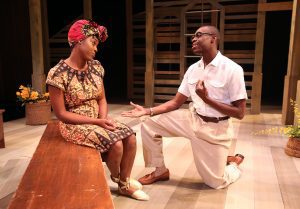 Barnes is equally superb as Adiel, as deliciously smitten with her soon-to-be “husband” as she is pragmatic about the couple’s future before transforming herself into Part II’s strong, assertive, loving spouse.
Barnes is equally superb as Adiel, as deliciously smitten with her soon-to-be “husband” as she is pragmatic about the couple’s future before transforming herself into Part II’s strong, assertive, loving spouse.
Nwoko may at first seem a chronological mismatch for a boy just barely into his teens, but there is method in this casting “madness,” the gifted NYU grad revealing a mutilated body and soul in need of healing and salvation that Part II may or may not provide.
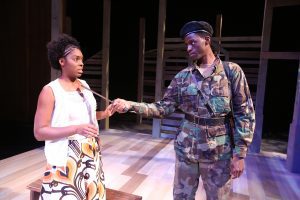 Demetrius Eugene Hodges completes the cast with a pair of deftly delineated roles, a Soldier who is both victim and victimizer and a young man deemed “less than” by a country grown no more tolerant with the passage of time.
Demetrius Eugene Hodges completes the cast with a pair of deftly delineated roles, a Soldier who is both victim and victimizer and a young man deemed “less than” by a country grown no more tolerant with the passage of time.
Yuri Okahana’s top-notch scenic design suggests precisely the kind of ramshackle town hall-turned-church that an American missionary couple might call home, while Patty and Gordon Briles’s properties design effectively suggests changes wrought over fourteen years.
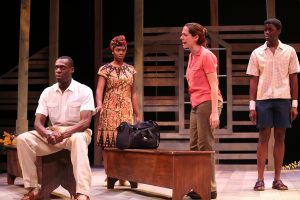 Kim DeShazo’s costumes go a long way towards transforming a trio of American actors into Ugandans (and Blaize from teen to adult), Donna Ruzika’s dramatic, nuanced lighting design is one of her best, and Dave Mickey’s sound design is quite effective save gunshots that sound more canned than live.
Kim DeShazo’s costumes go a long way towards transforming a trio of American actors into Ugandans (and Blaize from teen to adult), Donna Ruzika’s dramatic, nuanced lighting design is one of her best, and Dave Mickey’s sound design is quite effective save gunshots that sound more canned than live.
Additional kudos go to Anthony Gagliardi (hair and wig design) and music consultant Bill Wolfe.
Cardboard Piano is produced by desai. Jamie A. Tucker is production stage manager and Ruben Bolivar is assistant stage manager. Casting is by Michael Donovan, CSA. Richie Ferris, CSA is casting associate.
Uganda may be over 9000 miles away and its people’s lives every bit as distant from our own, but Cardboard Piano will have you reflecting on its characters, its themes, and the world in which it unfolds long after the lights have dimmed. This is L.A. theater at its compelling, thought-provoking best.
International City Theatre, Long Beach Performing Arts Center, 300 E. Ocean Blvd., Long Beach. Through May 20. Thursdays, Fridays, and Saturdays at 8:00. Sundays at 2:00. Reservations: 562 436-4610
www.InternationalCityTheatre.org
–Steven Stanley
May 4, 2018
Photos: Tracey Roman
Tags: Hansol Jung, International City Theatre, Los Angeles Theater Review



 Since 2007, Steven Stanley's StageSceneLA.com has spotlighted the best in Southern California theater via reviews, interviews, and its annual StageSceneLA Scenies.
Since 2007, Steven Stanley's StageSceneLA.com has spotlighted the best in Southern California theater via reviews, interviews, and its annual StageSceneLA Scenies.







 COPYRIGHT 2025 STEVEN STANLEY :: DESIGN BY
COPYRIGHT 2025 STEVEN STANLEY :: DESIGN BY